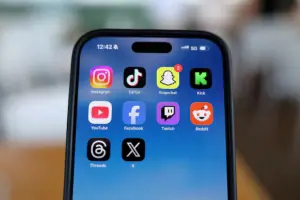Deinfluencing, or the art of negative reviews
3 min readWASHINGTON: Looking straight into the camera, Valeria Fride holds up a tube of lip gloss. But instead of saying how amazing it is, the young brunette trashes it as “so sticky” and “really expensive,” with not enough color.
“It just didn’t do it for me,” the 23-year-old concludes.
Welcome to the art of deinfluencing, one of the latest trends on TikTok, in which influencers tell you what not to buy. As of early April, the hashtag had more than 430 million views on the wildly popular video-sharing app.
“It’s an honest version of what we see every day on social media,” Fride tells AFP.
If you venture onto TikTok, you can find all kinds of videos about which soaps not to buy because they’re too pricey, or which dumbbells not to buy if you’re just a beginner with using weights.
Some have cast deinfluencing as a response to soaring inflation, or even an anti-consumerist movement – basically, don’t buy things that are not worth your money.
“Do you really need 25 different perfumes? Are you really going to use them all?” said a TikTok user in a video with the hashtag.
But others say influencers are doing the same thing as before, with a slightly more palatable name.
Indeed, influencers are everywhere on social media. They make short, catchy videos promoting everything from mascara to tea to sneakers to video games – all for a tidy fee.
In theory, criticizing products would run counter to their business model. Who would pay for that?
Fride admits that at first, she was “really scared” how certain brands would respond to her new tactics.
When one of her videos went viral, she says she told her mother: “I hope they don’t hate me.” But it ultimately led to offers of new partnerships with companies who appreciated her negative reviews for their rivals.
For Fride, it’s a sign that companies “want a more nuanced review.”
56 pairs of shoes
Jessica Clifton, a 26-year-old American influencer, explains that the deinfluencing trend rang true for her.
A few years ago, she became aware of the impact her conspicuous consumption – new clothes virtually every day in separate packaging, endless varieties of foundation makeup, a plethora of lipsticks– was having on the environment.
“I don’t even know how to use makeup,” Clifton told AFP, adding that she realized she owned 56 pairs of shoes.
“I was like, ‘Oh my God, how did I get here?’” Clifton opened a new TikTok account dedicated to responsible consumption.
So she was thrilled when deinfluencing took off. She’s even posted a few videos with the hashtag.
But she says she’s disappointed that the trend quickly became about “buy this, not that” instead of curbing overall consumption, and about users simply trying to get new followers.
Authenticity
A quick glance at the latest videos posted on TikTok with the deinfluencing hashtag shows that Clifton is not alone in her disappointment.
But Lia Haberman, an expert on influencer marketing who lectures in the continuing education program at University of California Los Angeles (UCLA), says seeing the deinfluencer trend as a rejection of consumer culture is misguided.
“That’s not how the trend originated,” she told AFP.
According to Tubular Labs, a social media analytics firm, the trend – which really took off in January – first emerged in September 2022, thanks to one Maddie Wells.
Wells is not exactly a campaigner; the influencer was simply using her experience working in cosmetics stores to explain why customers were unhappy with certain products.
Her videos were not “really a judgment call,” explains Haberman.
For Americus Reed, a professor of marketing at the University of Pennsylvania’s Wharton School of Business, influencers are “no longer seen as authentic” by the public, which knows they are being paid to promote products.
A deinfluencer, at least for now, is seen as more honest.
“That’s a way to stand out,” Reed says, while admitting that in the end, “a deinfluencer is still an influencer.”
For the latest news, follow us on Twitter @Aaj_Urdu. We are also on Facebook, Instagram and YouTube.


























Comments are closed on this story.